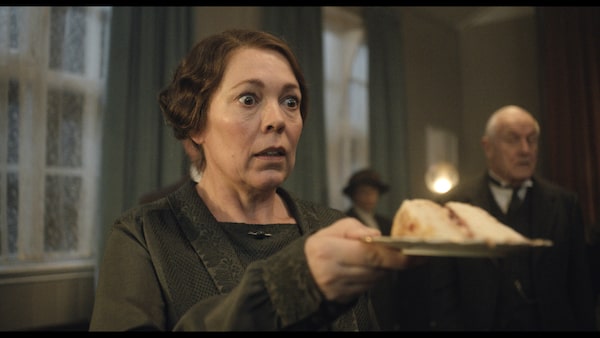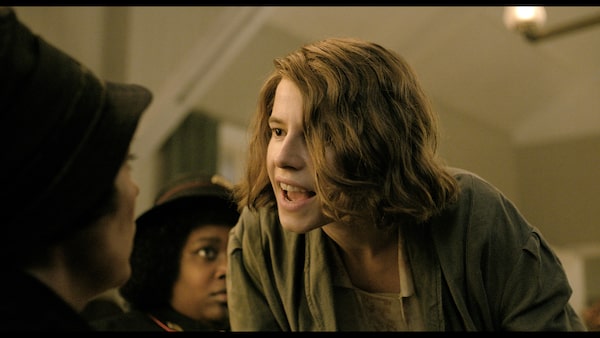- Wicked Little Letters
- Directed by Thea Sharrock
- Written by Jonny Sweet
- Starring Olivia Colman, Jesse Buckley, Timothy Spall
- Opens in select theatres April 5
- Classification 14A; 100 minutes
There’s giddy fun to be had in Wicked Little Letters, based on a true scandal that titillated 1920s England: Edith Swan (Olivia Colman), an unmarried, upstanding (and in the film, uptight) dutiful daughter who lived in a cramped row house in Littlehampton, West Sussex, with her dictatorial father Edward (Timothy Spall) and ineffectual mother Victoria (Gemma Jones), began receiving scathing letters flooded with florid filth.
The immediate suspect was Edith’s next-door neighbour, Rose Gooding (Jessie Buckley, teaming up with Colman again after their success in The Lost Daughter), a foul-mouthed, free-spirited, widowed mother. Soon the poisonous letters were corroding mailboxes all over town, and then all over England. Eventually the case was cracked by Gladys Moss (Anjana Vasan), Sussex’s first female police officer.
Too many movies on your to-watch list? Here are the best films of 2023

Olivia Coleman as Edith Swan in Wicked Little Letters.Parisa Taghizadeh/Mongrel Media
Written by Jonny Sweet and directed by Thea Sharrock (Me Before You), the film suffers from a slight case of the twinklies – eyes pop a tad too cartoonishly, mouths hang a bit too agape, and the female posse Moss recruits to keep an eye on the feuding neighbours are a shade too colourful.
But it’s saved, first by strong performances from Buckley, always effortlessly believable, and Colman, expert at laying bare the clammy soul of easily dismissible women. And second, by the letters themselves, which are so in love with language, so overflowing with ornately operatic insults – unprintable in this paper; the best I can offer is “sack of chicken piss” – they could have been written by Shakespeare himself.

Jessie Buckley as Rose Gooding in Wicked Little Letters.Parisa Taghizadeh/Mongrel Media
Underneath the giggles, however, there is one wordless scene that’s haunted me since last September, when I first saw it at the Toronto International Film Festival. It’s what this movie is really about. Victoria has died. Edith had hoped this would release her from the family home and into, finally, her own life. But Edward – dominant, rageful, terrifying – won’t hear of it. He needs her to serve him.
In the scene, Edith sets a bowl of food at Edward’s plate. He takes one spoonful. Without looking at her, he rises and scrapes the lot into the trash. In this single gesture, the entire patriarchy is encapsulated: the entitlement of this utterly unexceptional man, his hauteur, his certainty that not only can he be as cruel as he likes, he deserves to be. If only a deluge of nasty letters could bury him alive.
In the interest of consistency across all critics’ reviews, The Globe has eliminated its star-rating system in film and theatre to align with coverage of music, books, visual arts and dance. Instead, works of excellence will be noted with a critic’s pick designation across all coverage. (Television reviews, typically based on an incomplete season, are exempt.)